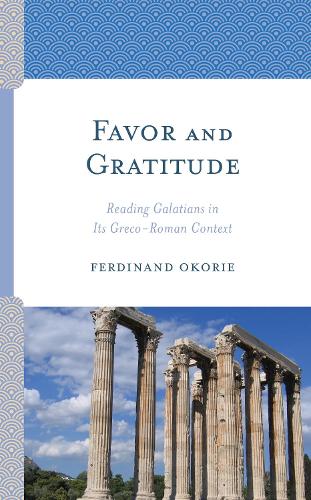
Favor and Gratitude: Reading Galatians in Its Greco-Roman Context
(Hardback)
Publishing Details
Favor and Gratitude: Reading Galatians in Its Greco-Roman Context
By (Author) Ferdinand Okorie
Bloomsbury Publishing PLC
Lexington Books/Fortress Academic
3rd December 2020
United States
Classifications
Professional and Scholarly
Non Fiction
Christianity
227.406
Physical Properties
Hardback
158
Width 162mm, Height 241mm, Spine 16mm
376g
Description
This book examines Pauls appeals to Greco-Roman values in his Epistle to the Galatians.
Reviews
Okories fresh study of Galatians investigates the way that Paul uses the language of benefaction and friendship to persuade his auditors to adopt his version of the gospel message. Paul not only wants to convince the Galatians to recognize Gods benefaction toward them, but they too can and must act toward one another with fellowship, equality, goodwill, etc. This is a most valuable book for Pauline studies.
-- Barbara E. Reid, O.P., Catholic Theological UnionHow did Pauls Gentile Galatian audience, steeped in the Hellenistic ethos of patron-client reciprocity, hear Pauls message of charis and pistis Okorie persuasively argues that charis in Galatians be rendered favor and pistis gratitude. Gods favor or goodwill towards the Galatians is ; what they do to acknowledge this is also called . Both patron and client are reliable and faithful the patron in rendering promised assistance, the client in being grateful, loyal, and committed. Okories scintillating research breaks new ground in scholarship and uncovers layers of hitherto fallow meaning. To read this book is to read Galatians, indeed Paul, again for the first time!
-- James Chukwuma Okoye, C.S.Sp., Duquesne UniversityOkorie offers an excellent and persuasive reading of how the Galatian audience understands the concepts of faith and grace in light of benefaction in their own cultural context. Scholars, students, and pastors alike will benefit from this book that illuminates key points of Paul's theology, as well as his talent for communication.
-- Timothy Milinovich, Dominican UniversityAuthor Bio
Ferdinand Okorie is director of Bible studies and travel programs and assistant professor of New Testament and at Catholic Theological Union.
